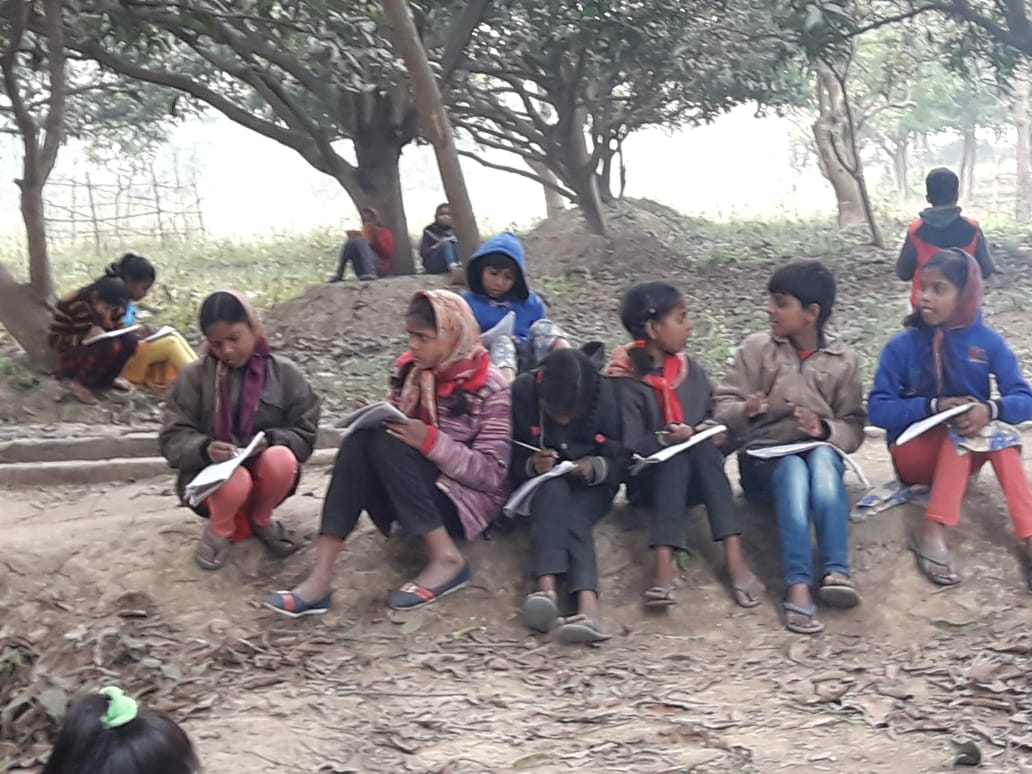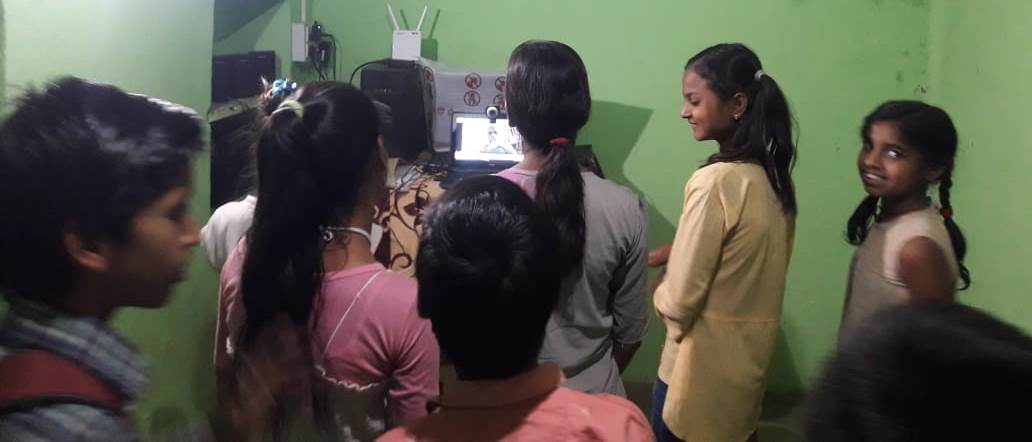Teaching is a constant process of learning; and this time I am feeling it rather intensely in the process of my engagement with a group of rural children (thanks to the Shiksha Swaraj initiative) in Bihar. Well, if I use the standardized sociological idiom, these children are primarily ‘first generation learners’, and they belong to ‘marginalized’ castes in a hierarchical caste-ridden society. And they are enrolled in nearby government schools. As a creative resource centre located in a remote village, Shiksha Swaraj seeks to work with the local children, and generate a life-affirming/ creative learning community through pedagogic innovations and other cultural practices. Hence, I realize that my task would by no means be easy. Well, as a university professor, I engage with mature adults, theorize all sorts of educational philosophy, and deliver lectures on Tagore and Krishnamurti, or Illich and Freire. I am used to the ‘techniques’ of higher education. But then, can I actually practice what I preach—education as a celebration, a play, a creative affirmation? Can I do something truly ‘alternative’—and that too in rural Bihar? Or is it that ‘alternative’ education is the monopoly of the likes of Rishi Valley School that attract primarily the cultural elite; and others—particularly, the poor devoid of the required ‘cultural capital’—are not prepared for it? Yet, amid this doubt, I manage to hear the inner voice; I feel that I can work with these children, and do something truly meaningful; and I begin my journey.
Initial Difficulties and the Curved Trajectory
To begin with, let me refer to the difficulties or obstacles that I confront. First, it is not easy to convince the local community and even the parents that education can be a joyful/creative endeavor; and intense/meaningful learning can take place outside formal schools and rapidly growing coaching centres. It is not easy to make them believe that there is something worth learning beyond textbooks, examinations and all sorts of instant knowledge capsules that coaching centres and guide books sell. As a matter of fact, the prevalent practice of education characterized by regimented schools and instrumental coaching centres has conditioned the mind to such an extent that it is not easy to believe that a teacher can be a friend, a co-traveller, a catalyst—someone who does not believe in corporal punishment or in the oppressive act of ‘disciplining’ through abusing/humiliating children. It is difficult to believe that education can be experiential, life-affirming and joyful. Hence, it is not surprising that quite often even the children (not merely the parents) I interact with get confused. Why is it that there is no specific book, no fixed syllabus, and no examination? And why is it that even mathematics (yes, I ‘teach’ them mathematics) is full of laughter, joy and playful activities? And why is it that instead of forcing them to memorize all sorts of formulae, I am urging them to understand and experience the basic mathematical concepts? Or, why am I not in hurry to ‘cover’ the official syllabus?
There is yet another difficulty. Is it possible for them to give me sufficient time because schools and ‘private tutors’ have already burdened them with all sorts of ‘assignments’? Can joyful learning be a priority in such an environment? Can the parents feel its worth, and persuade their children to take part in our endeavor? Or will they see it as some sort of ‘idealism’ without much ‘practical use’?
The path, I realize, is not easy; it is bound to have its ups and downs. Yes, I notice the lack of enthusiasm among some children (or their parents); and eventually, they drop out. Yet, despite these difficulties, challenges and obstacles, I choose to carry on.
Is something happening?

The Flowering of a Relationship
Yes, in this process I am rediscovering myself. I am not my ‘bio data’—my ‘ego’, my ‘knowledge’, my ‘status’; instead, with heightened empathy, I become a child, enter their inner world, and begin to communicate with them. With this act of communion, I realize that the wall of separation is breaking; and instead of fearing me, they have begun to love me. In their eyes I see curiosity and joy; in their gestures and expressions I find a relaxed orientation; and when with me, they say—we play with mathematics, we love mathematics— everything around us becomes musical. For me, this shift—from fear to love or from passivity to creative agency—is tremendously important. No learning, I realize, is possible without love, trust and communion.
I learn yet another important lesson of life. Every child is beautiful; every child is a possibility—a flower that needs to be bloomed. See the violence of our times. When ‘class’ and ‘caste’, or economic inequality and social hierarchy merge, the children I am interacting with, it is obvious, are often stigmatized and humiliated by the people around. Moreover, in a caste-ridden society, it is assumed that nothing is going to happen to these children, and they do not deserve good education, and they are destined to engage in what is regarded as ‘polluted’ work (I have seen the so-called forward caste people taunting them by saying: What do you think? Will you become a magistrate?). But then, they appear to me as great tutors. In their eyes I see authentic beauty; and in their life-energy I see fresh air. Possibly, they too begin to realize that unlike what the violent/hierarchical society thinks, they are potentially creative persons with self-dignity. Well, through mathematics, a relationship has begun to evolve. And this communion is no less important than solving the riddles relating to arithmetic, algebra and geometry.
Dancing with Mathematics
As I begin to communicate with them—and in a reasonably non-hierarchical/non-judgmental way, they reveal themselves. And I understand their conceptual problems, the difficulties they face while doing mathematics, and the fear associated with the subject. It becomes clear to me that in the name of completing the syllabus, schools and coaching centres often compel them to memorize a set of theorems or formulae without basic understanding. As a result, they fear mathematics, or fail to relate it to any real life situation. For instance, they know the standard method of finding the Highest Common Factor (HCF) or Lowest Common Multiple (LCM) of a set of numbers; but some of them do not know why HCF is called HCH, or LCM is called LCM. Or for that matter, some of them can solve—almost mechanically—an algebraic equation; but they have no idea about the concept of a ‘variable’ and a ‘constant’. Likewise, most of them cannot conceptualize the notion of a negative integer.

It doesn’t surprise me. Our pedagogic failure or our inability to relate elementary mathematics to the real/living/experiential world often causes mathematics phobia, or conceptual confusion. I, therefore, choose to free myself from the burden of bookish mathematics. Instead, I seek to activate their eyes, hands and legs; I try my best to make them feel and see mathematics. Hence, they are encouraged to see geometry in their bodies—say, the formation of angles in different bodily movements. They are encouraged to engage in a rhythmic dance, and understand the circular rotation—from 0 degree to 360 degree. They are inspired to discover different geometrical shapes—triangles, circles, spheres, rectangles and squares in the real world they see and touch, be it a wall, a floor, a door, or a field. And yes, they slowly begin to understand how algebra begins with the interplay of a ‘variable’ and a ‘constant’. Through repeated conversations they realize that, say, Kaveri’s age is a ‘variable’ since every moment she is getting older. However, the fact that her mother is 30 years older than her is a ‘constant’. Hence, even after 20 years, although Kaveri’s or her mother’s age will change, the difference between their ages will remain the same. So, if Kaveri’s age is x (yes, x is a ‘variable’), and her mother’s age is y (y too is a ‘variable’), we can express it through the following algebraic equation:
Y= x+ 30
And through this equation, she can now calculate Kaveri’s age when her mother will be 70 years old. She can also calculate Kaveri’s mother’s age when Kaveri was a 5-year-old girl. I take time, even if the teacher thinks that it is simple. The child needs to understand and internalize it. I, therefore, lose no opportunity to make them see mathematics—say, the play of numbers—in everyday life. As the experiential domain becomes my ‘text’, they begin to understand these basic mathematical concepts; and slowly but steadily they are seeing the beauty of mathematics.
Epilogue
Well, I have spoken of mathematics as just an illustration. Essentially, Shaksha Swaraj has emerged out of a noble dream—rescuing the spirit of life-affirming creative education from the monopoly of the select elite. This has emerged out of a deep realization that every child is unique and endowed with a great possibility. This has emerged out of a realization that truly meaningful learning happens outside formal schools and coaching centres. In a corrupt/violent world, a noble experiment like this will face enormous difficulties. Yet, as I feel, all efforts ought to be made to keep it alive.
I am grateful to Shiksha Swaraj for giving me an opportunity to take part in this noble project.
Avijit Pathak is Professor of Sociology at JNU.
Shiksha Swaraj (शिक्षा स्वराज) is an educational endeavor (library, learning and resource centre) aimed at establishing and realising the goal of self-reliance or Swaraj through the light of education-initiated by The New Leam.


